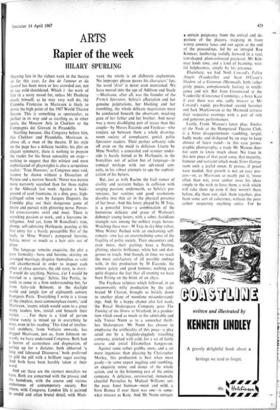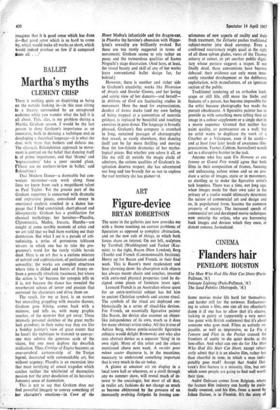Rapier of the week ARTS
HILARY SPURLING
Opening late in the richest week in the theatre so far this year, Le Ieu de tamour et du hasard has been more or less crowded out, not to say cold-shouldered. Which if the work of fate in a nasty mood for, unless Mr Daubeny excels himself, as he may very well do, the Comedic Francaise in Marivaux is likely to prove the high point of the 1967 World Theatre Season. This is something as spectacular, as perfect in its way and as startling as, in other years, the Moscow Arts in Chekhov or the Compagnia dei Giovani in Pirandello.
Startling because, like Congreve before him, like Chekhov and Pirandello, Marivaux is, above all, a man of the theatre. If his style on the page has a delicate lucidity, his plot an elegant symmetry, there is nothing to prepare the reader for his fierce sensuality on stage— nothing to suggest that this wittiest and most sophisticated of playwrights is also a scrupulous realist: 'True Humour,' as Congreve once said, 'cannot be shown without a Dissection of Nature and a narrow Search.' Never was nature more narrowly searched than for three nights at the Aldwych last week. Against a back- ground of cool fountains, in a dim, grey, high- ceilinged salon (sets by Jacques Dupont), the Comedie play out their dangerous game of desire and pursuit with glittering nerve. Power- ful cross-currents swirl and meet. There is scorching passion at work, and a fearsome in- telligence. And yet, from M Rousillon's trim, plump, self-admiring Harlequin, pausing at his first entry for a barely perceptible flirt of the heels, to Mme Winter's pampered heroine, Sylvia, never so much as a hair stirs out of place.
The language remains exquisite, the plot a pure formality—hero and heroine, skirting an arranged marriage, disguise themselves as valet and chambermaid in order to inspect each other at close quarters, the old story, in short: 'I would do anything, Nerissa, e'er I would be married to a sponge.' Sylvia, like Portia, in- tends to come to a firm understanding but, far from fairy-tale Belmont, in the daylight world and jungle law of eighteenth century bourgeois Paris. 'Everything I write is a tissue of the simplest, most commonplace events,' said Marivaux, 'events which would seem to a great many readers low, trivial and beneath their notice. . . . For there is a kind of person whose vanity is mixed up in everything he does, even in his reading.' This kind of intellec- tual snobbery, from Voltaire onwards, has dogged Marivaux, just as, from Johnson on- wards, we have underrated Congreve. Both had a horror of earnestness and dogmatism, of setting up for a dictator, both abhorred 'a long and laboured Discourse,' both preferred to gild the pill with a brilliant sugar coating. And both have been harshly taken at their word.
And yet these are the sternest moralists we have. Both are concerned with the prosaic and the humdrum, with the coarse and vicious undertones of contemporary society. But Where, with Congreve, London life is painted in sordid and often brutal detail, with Mari- vaux the whole is an elaborate euphemism. No improper phrase passes his characters' lips, the word 'desk' is never even mentioned. We have moved into the age of Addison and Steele —Marivaux, after all, was the founder of the French Spectator. Sylvia's affectation and her genuine palpitations, her blushing and her trembling, the whole delicate negotiation must be conducted beneath the observant, mocking gaze of her father and her brother. And never was a more disobliging pair of teases than this couple—by Messrs Escande and Feydeau—who conjure up between them a whole drawing- room society of complacent, genial, polite Spectator readers. Their perfect urbanity rubs off even on the maid (a delicious Lisette by Mme Noelle); a concealed and seamier under- side is barely hinted at by Harlequin, in the brutalities not of action but of language—in comical mishaps with too advanced con- ceits, in his robust attempts to ape the sophisti- cation of his betters.
But, just as with Racine the frail veneer of civility and restraint bulges in collision with surging passions underneath, so Sylvia's pre- tensions, her vanities and good resolutions dissolve into thin air in the physical presence of her lover. And this lover, played by M Toja, is a powerful force—a combination of the humorous delicacy and grace of Watteau's debonair young lovers, with a sober, fastidious strength rare among the noblest tragic heroes. Watching these two—M Toja in sky-blue velvet, Mme Winter flushed with an enchanting self- conceit—one has an overwhelming sense of the fragility of polite society. Their encounters and, even more, their partings have a fleeting, glinting, electric brilliance, white hot and dan- gerous to touch. And though, in time, we reach the most satisfactory of all possible endings with, in this production by M Escande, the utmost gaiety and good humour, nothing can quite disguise the fact that all evening we have been flirting on the brink of an abyss.
The Feydeau tailpiece which followed, in an uncommonly nifty production by the cele- brated M Charon, brought us briskly down to another plane of mundane misunderstand- ings. And, by a happy chance also last week, the Royal Shakespeare Company gave The Taming of the Shrew at Stratford, in a produc- tion which owed as much to the admirable and wily Trevor Nunn as to a somewhat thrift- less Shakespeare. Mr Nunn has chosen to emphasise the artificiality of this piece—a play acted out by a higgledy-piggledy travelling company, pinched with cold, for a set of fairly
coarse and jovial Elizabethan hangers-on. Against some rather grubby snow, and a set more ingenious than pleasing by Christopher Morley, this production is best when most gaudy—in some expert juggling and tumbling, an exquisite mime and dance of the whole action, and in the brimming zest of the entire company. A delicious, extroverted, immensely cheerful Petruchio by Michael Williams sets the pace. Janet Suzman—meek and mild, a born Bianca if ever there was one—is some- what miscast as Kate. And Mr Nunn extracts
a certain poignancy from the arrival and de- parture of the players, traipsing in from wintry country lanes and out again at the end of the proceedings, led by an intrepid Roy Kinnear, lumbering stolidly forward in a vast, tent-shaped, plum-coloured greatcoat. Mr Kin- near lends tone, and a kind of beaming, wist- ful helplessness, simply by his presence.
Elsewhere, we had Noel Coward's Fallen Angels (Vaudeville) and Sean O'Casey's Shadow of a Gunman (Mermaid), both rather grisly pieces, conspicuously lacking in intelli- gence and wit. But Joan Greenwood at the Vaudeville (Constance Cummings, a born Kate if ever there was one, sadly miscast as Mr Coward's vapid, pea-brained second heroine) and Jack MacGowran at the Mermaid retrieve their respective evenings with a pair of rich and generous performances.
Lastly, Frank Marcus's latest play, Studies of the Nude at the Hampstead Theatre Club, is a bitter disappointment—rambling, turgid, badly made, and disfigured by an urge to keep abreast of latest trends—in this case porno- graphic photography, a trade Mr Marcus does not seem to know much about. No trace in this new piece of that good sense, that maturity, humour and restraint which made Sister George seem such a joyful omen. It proves, if proof were needed, that growth is not an easy pro- cess—or, as Marivaux so neatly put it, 'more often than not, your author owes his ideas simply to the wish to have them, a wish which will rake them up even if they weren't there before, dig them out, stick them together, give them some sort of coherence, without the poor author suspecting anything amiss. For he imagines that it is good sense which has done it—that good sense which is so hard to come by, which would make all works so short, which Would indeed produce so few if it composed iiiem all. . .































 Previous page
Previous page